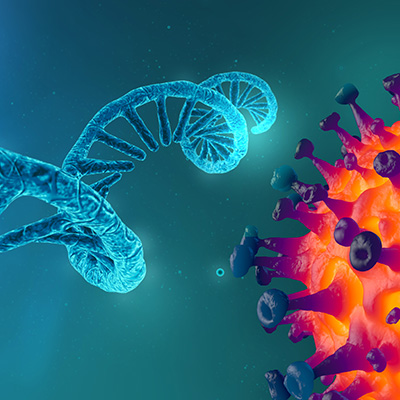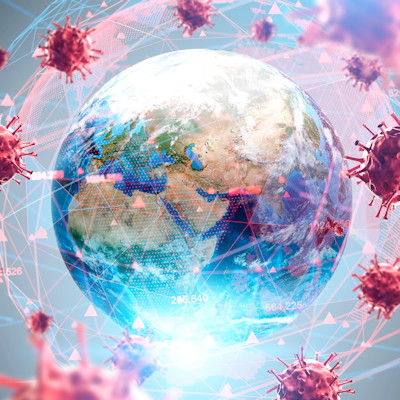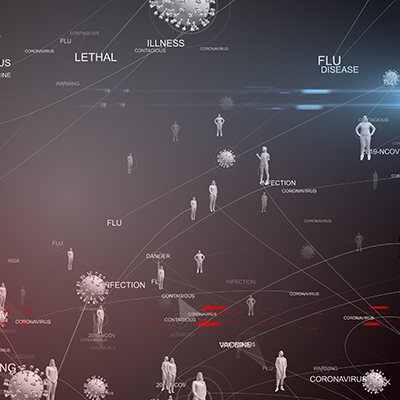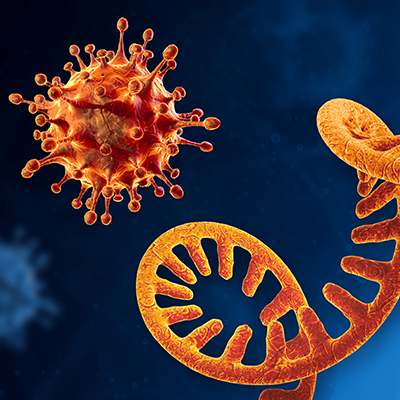December 15, 2020 -- Genes associated with antiviral immunity and lung inflammation have been tied to severe cases of COVID-19 in a new genome-wide analysis conducted in the U.K. The results, published in Nature on December 11, reveal new therapeutic targets for drug repurposing and development efforts.
Susceptibility to infectious diseases and immune-mediated diseases are strongly heritable. For instance, in COVID-19, one genetic locus, in 3p21.31, has been associated with hospitalization. Patients with critical COVID-19 respiratory failure represent a distinct disease phenotype with differing patterns of symptoms and unique pathophysiology compared to more mild forms of the disease.
Genome-wide studies have the potential to reveal new molecular mechanisms of critical illness in COVID-19, which may provide insights into which therapeutic targets best modulate host immune responses. Identification of genetic loci associated with COVID-19 may lead to specific therapeutic targets.
In the new study, researchers from the University of Edinburgh made the discovery by studying the DNA of 2,700 patients in 208 intensive care units in the U.K. The researchers are part of the Genetics of Mortality in Critical Care consortium (GenOMICC), a global collaboration which studies genetics in critical illness.
These genetic samples were compared to genetic information of healthy volunteers from other studies such as U.K. Biobank, Generation Scotland, and 100,000 Genomes. The researchers conducted genome-wide and transcriptome-wide association studies for critical COVID-19 illness.
The team found significant differences in five genes in patients who required intensive care unit treatment compared with samples provided by healthy volunteers. The genes -- IFNAR2, TYK2, OAS, DPP9, and CCR2 -- partially explain why some people become extremely sick with COVID-19, while others are not affected.
Two of these genes, IFNAR2 and OAS, are important in the early stages of the disease, whereas the other genes (DPP9, TYK2, and CCR2) drive inflammatory lung injury in the late stages of critical COVID-19.
The analysis showed that increased expression of IFNAR2 reduced the odds of severe COVID-19, suggesting a protective role of the molecule. This finding implies that if interferons are administered to treat critical COVID-19 cases, they would be successful in preventing disease.
However, in clinical settings this has not been the case. This led the group to suggest that the genetic effect of interferons may be mediated during the earliest phases of the disease when viral load is high, and prior to hospitalization.
There are several variants in the OAS gene cluster (OAS1, OAS2 and OAS3) and transcriptome-wide analysis found a significant association between OAS3 and severe COVID-19. These genes encode an important replication intermediate of coronaviruses and therefore offer a potential therapeutic target.
The team found an association in an intronic variant in the gene encoding dipeptidyl peptidase 9 (DPP9). Variants in this locus are associated with chronic lung disease. DPP9 encodes a serine protease with diverse intracellular functions, including cleavage of the key antiviral signaling mediator CXC motif chemokine ligand 10 (CXCL10), with key roles in antigen presentation,4 and inflammosome activation.
The analysis revealed a strong association between TYK2 and severe COVID-19. Importantly, TYK2 is one of four gene targets for Janus kinase inhibitors such as baricitinib, which has been issued an emergency use authorization by the U.S. Food and Drug Administration for the treatment of hospitalized COVID-19 patients.
Lastly, the researchers found an association with critical cases of COVID-19 for genotype-inferred CCR2 expression, which is particularly strong in lung tissue. CCR2 promotes monocyte/macrophage chemotaxis toward sites of inflammation and has been identified in bronchoalveolar lavage fluid from the lungs of COVID-19 patients on mechanical ventilation.
The scientists suggested that anti-CCR2 monoclonal antibody therapies, which are used to treat rheumatoid arthritis and are considered safe, may be of interest for the treatment of severe COVID-19.
"Our genetic results provide a roadmap through the complexity of immune signals, showing the route to key drug targets," said principal investigator Kenneth Baillie, PhD, academic consultant in critical care medicine and senior research fellow at the University of Edinburgh's Roslin Institute, in a statement. "Our results immediately highlight which drugs should be at the top of the list for clinical testing. We can only test a few drugs at a time, so making the right choices will save thousands of lives."
Do you have a unique perspective on your research related to infectious disease research or virology? Contact the editor today to learn more.
Copyright © 2020 scienceboard.net










